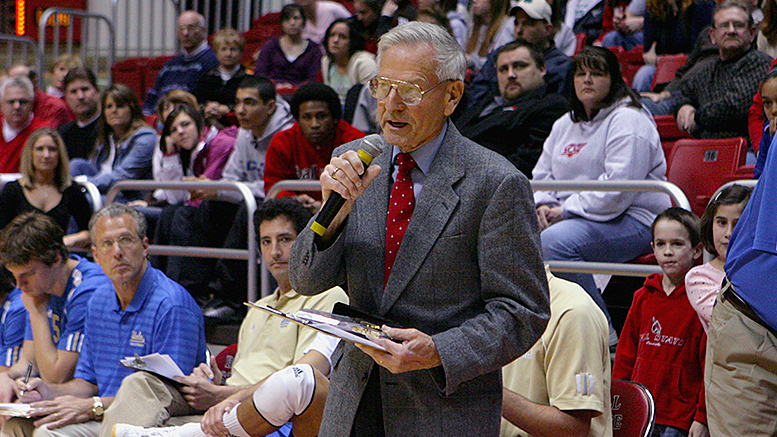By: BSU News –
MUNCIE, Ind. – The Ball State University Board of Trustees today approved the naming of the Dr. Don Shondell Practice Center, to be built adjacent to Worthen Arena.
Funded via the Ball State University Cardinal Commitment campaign, which raised $20.6 million, the $6.4 million facility will provide practice space for the women’s and men’s basketball and volleyball programs. The facility will also house a training room, study room and individual team meeting rooms.
Shondell, the legendary International Volleyball Hall of Fame former head coach for Ball State’s men’s volleyball team, amassed a career record that included 20 Midwest Intercollegiate Volleyball Association (MIVA) titles and 13 trips to the NCAA tournament. He started men’s volleyball at Ball State in 1959, and though he retired in 1998, Shondell’s influence on the program and student-athletes is still felt today.
“We are grateful for the support of the many alumni and friends who have made this facility a reality,” said Mark Sandy, director of athletics. “And what better statement could be made about the value of athletics in providing our student-athletes opportunities for academic excellence, leadership and community engagement, than to name this facility for one of the finest individuals Ball State has known.”
The board also reviewed the university’s state budget request proposal for the 2017-19 biennium.
This season’s capital priority is Phase II of the STEM and Health Professions Facility Expansion Project, with an estimated cost of $87.5 million. This is the next phase in the replacement of the Cooper Science Complex and would house the growing academic disciplines of biology, chemistry, geology and physiology, along with modernized lab space.
During the last biennium, the Indiana General Assembly appropriated $62.5 million for Phase I of the replacement of Cooper Science Complex, whose construction dates to the 1960s. Phase 1 funding allowed for the creation of the new College of Health, with construction on that building planned to begin in spring 2017.
“Our state’s expanding life sciences sector is helping to spur enrollment growth in these academic areas,” said Board Chair Rick Hall. “Ball State’s ability to meet that growing demand, with contemporary teaching and research facilities that best serve students, is a long-term commitment to the citizens of Indiana.”
In other business, the board heard a report from University Police Chief James Duckham and Ro Anne Royer Engle, interim associate vice president for Student Affairs and Enrollment Services, on initiatives that offer a multicultural approach to community policing. This is an approach that emphasizes the need for consistent positive contacts through outreach programs such as Lunch with a Cop, a favorite of students and officers, and the burglary-prevention program that involves officers literally going door-to-door in neighborhoods near campus to talk with students in their homes. One initiative new this year is the Hall Officers Program that began with the start of the fall semester. Police officers are assigned to individual residence halls in an effort to get to know students better.
“We want to do all we can to build relationships between our officers and our students, and these types of nontraditional, social activities further that work,” Duckham said. “Those relationships break down barriers, build trust and open important lines of communication.”
Added Royer Engle, “These programs allow the officers to become familiar to our students and faculty, and that contributes to a safer community.”
And the board approved an honorary doctor of laws degree for Ambassador Karl Eikenberry, in recognition of his exemplary military and foreign service career. Eikenberry will be the Fall Commencement speaker at Ball State exercises on Dec. 17 at Worthen Arena.
A three-star general, Eikenberry graduated from West Point in 1973, has master’s degrees from Harvard University in East Asian studies and Stanford University in political science, and was a National Security Fellow at the Kennedy School of Government at Harvard. Throughout his military career, he commanded or held staff positions in various units including airborne and ranger, at posts at home and abroad. Additionally, Eikenberry served as assistant Army attache and later as defense attache in the U.S. Embassy in China. Currently, he is the Oksenberg-Rohlen Distinguished Fellow and director of the U.S. Asia Security Initiative at the Walter H. Shorenstein Asia-Pacific Research Center at Stanford University.
In addition to Eikenberry’s many military awards, he has received the U.S. Department of State Distinguished, Superior, and Meritorious Honor Awards.
Finally, the board approved the 2017 health care plans. As discussed at the last board meeting, the university’s careful stewardship of the program has resulted in only a 2 percent increase in premiums, despite rising health care costs.




